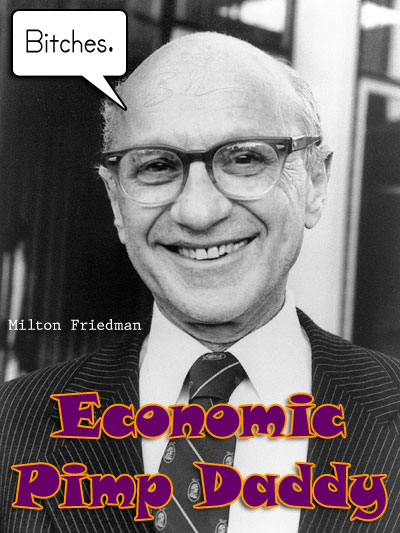 Here's an excellent piece on economics by Paul Krugman at the NY Times. I taught Business Ethics for 4 quarters, and let me tell you, those undergrads ate up everything Milton Friedman said, even as I trashed him to the best of my ability. Now I think I was a little too harsh on Milton.
Here's an excellent piece on economics by Paul Krugman at the NY Times. I taught Business Ethics for 4 quarters, and let me tell you, those undergrads ate up everything Milton Friedman said, even as I trashed him to the best of my ability. Now I think I was a little too harsh on Milton.I've always known that Adam Smith was as poorly understood as he was quoted. Remember this from high school economics:
"By preferring the support of domestic to that of foreign industry, he intends only his own security; and by directing that industry in such a manner as its produce may be of the greatest value, he intends only his own gain, and he is in this, as in many other cases, led by an invisible hand to promote an end which was no part of his intention. Nor is it always the worse for the society that it was no part of it. By pursuing his own interest he frequently promotes that of the society more effectually than when he really intends to promote it." (Book 4, Chapter 2)That's from the Wealth of Nations, the famous "Invisible Hand." But Adam Smith isn't saying that it's better if everyone pursues self-interests. The point is that the good of society can be advanced by self-interested actors, not that it should be. Adam Smith was a moral philosopher, and before the Wealth of Nations came The Theory of Moral Sentiments.
He's pretty clear about this, even within the Wealth of Nations. Just before the Invisible Hand comes out, he says
"[a]ll for ourselves, and nothing for other people, seems, in every age of the world, to have been the vile maxim of the masters of mankind." (Book 3, Chapter 4)The point, where was the point? Yes, I didn't realize until now that I was being too harsh on Milton Friedman while teaching. As Krugman argues, he isn't the hardcore neo-classical economist of today, although his writings certainly spawned the current crop. He is more moderate than I gave him credit for, just as Adam Smith is more moderate than most people realize. Luckily I don't think anyone was listening, so no harm done.
Oh yes, and economics is as scientific as killing rats.
No comments:
Post a Comment